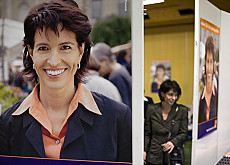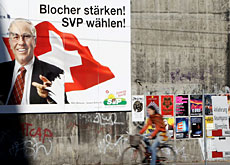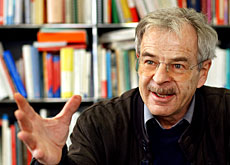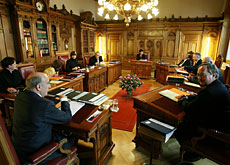Personalities drive Swiss election campaign

The run-up to this month's parliamentary elections is dominated by the rightwing Swiss People's Party, says a foreign observer.
British correspondent Peter Capella tells swissinfo that personalities have played a much bigger role than ever before in Swiss politics, but no major changes are expected.
Capella, a veteran journalist who has lived in Switzerland for nearly two decades, is a Geneva-based reporter for news agency Agence France-Presse.
He says that despite the more colourful nature of the electoral run-up, he still misses the cut and thrust of politics found in neighbouring countries.
swissinfo: With the Swiss elections coming up, what is of interest for a foreign audience?
Peter Capella: It’s not that different than for a Swiss audience. The biggest pole of interest at the moment is Christoph Blocher. The Swiss justice minister has been a controversial figure for many years and that’s still the case. That controversy also runs into the Swiss People’s Party, of which he is a leading member, and the far right in Switzerland. That’s obviously a story that attracts a foreign audience because it seems unusual in the Swiss context.
Switzerland is a country that is very consensus minded, very peaceful, it seems to be a country where people try to get on with one another regardless of their background, race, religion or language differences. At the same time you have this party that seems very much against tolerance in some ways and is the most popular [political] force in the country.
swissinfo: After nearly 20 years in Switzerland, are there still things that surprise you about Swiss politics?
P.C.: The steadiness and stability of Swiss politics still surprise me even if that’s a fundamental part of the whole Swiss attitude and system. Politicians are regarded more as technocrats or problem solvers. They take a pragmatic approach to the main issues they have to legislate on. The way the clockwork keeps on ticking, the way the economy is run very smoothly regardless of the elections is quite amazing and never ceases to astonish me.
What I do miss is what you find in neighbouring countries – the cut and thrust of politics, the doubts about who might win an election, whether one party will be toppled by another, the personalities and so on.
swissinfo: How would you compare the current election campaign with those you’ve covered in the past?
P.C.: This year there has been a focus mainly on one person, Christoph Blocher. I think that is largely due to the press to be honest and I don’t think that’s going to be necessarily reflected in the vote. Things will stay largely the same as they are now except for a slight realignment within the centre-right parties, the Christian Democrats and the Radicals.
The difference now is the personalities coming to the fore. Blocher, obviously, because he’s controversial and occupies a lot of space. Many people don’t like him yet he remains at the forefront. The other parties are starting to follow suit. Look at the Christian Democrats who are putting forward to a degree their own minister, Doris Leuthard, who has an attractive personality and is quite a bright prospect. That hasn’t really been seen before.
We should also take note of the re-emergence of the Greens due to concerns about the environment. The main Green party has more than ten per cent of votes in opinion polls. And then there is something that is entirely new for Europe, which is the emergence of the Liberal Greens who are not associated with the left side of politics.
swissinfo: Elections are a key moment in any democracy. Is Switzerland special compared with other countries?
P.C.: It’s not that special. In fact, you might argue that in Switzerland, legislative elections are slightly less important than in other countries because the parliament has fewer powers than elsewhere. A lot of power is decentralised to the cantons and the local authorities.
On the other hand, parliament is important because it appoints the government, with representatives from the four main parties, although it never really changes.
swissinfo: Do you believe there will be major changes in Swiss politics in the next ten to 20 years?
P.C.: Changes take place very slowly in Switzerland. In ten to 20 years time, all those tiny fragmented changes taking place now will turn into something much bigger. I don’t know if Switzerland will be a much different country, in fact I doubt it very much.
Will it open up a bit more to Europe? Possibly, but if that’s going to happen the Swiss People’s Party will have lose its popularity very suddenly. I think, though, that the fundamentals of Swiss politics will not change much.
swissinfo-interview: Scott Capper
The 200 seats in the House of Representatives are allocated according to the size of the population in the 26 cantons. Every canton – or constituency – is entitled to at least one seat.
The system of proportional representation was introduced in 1919 and – unlike Germany for instance – there is no minimum threshold of votes for a party to gain a seat.
In principle cantons have two seats in the Senate except for six small so-called half-cantons which have one seat each. Elections to the Senate vary from canton to canton, but they all use the first-past-the-post system.
British of mixed background, Peter Capella has spent much of his 21 year career in journalism in and around Switzerland.
He first arrived in the country 19 years ago to join Swiss Radio International in Bern.
After returning to writing for several publications including The Times and then The Guardian, he has been with the news agency Agence France-Presse in Geneva since 2001 covering a range of topics from international affairs to Swiss politics and economics, as well as sport.

In compliance with the JTI standards
More: SWI swissinfo.ch certified by the Journalism Trust Initiative



You can find an overview of ongoing debates with our journalists here . Please join us!
If you want to start a conversation about a topic raised in this article or want to report factual errors, email us at english@swissinfo.ch.